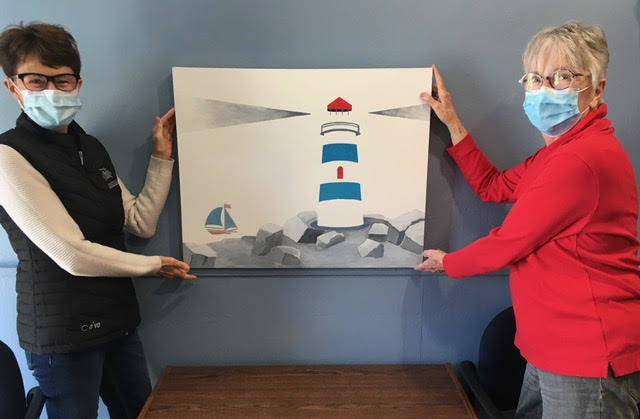
2021-05-05
Palliative Care Society opens office in Bridgewater
by KEVIN MCBAINLocal Journalism Initiative Reporter
The South Shore Hospice Palliative Care Society now has a place to call home.
The society has new office space in Bridgewater's Gateway Plaza, which it opened April 27, and then promptly closed the following day because of new COVID-19 regulations.
Until this point, volunteers have "literally been doing the work off of our dining room tables," Trudy Johnson, the society's chair, said in a recent media release. "We are excited to bring all of our resources together under one roof and have a place where people can come in."
Incorporated in July 2019, the society is a volunteer organization designed to create awareness of and support for palliative care in Queens and Lunenburg Counties.
The society helps support professional palliative staff by increasing awareness of palliative care and helping to provide financial support for those who need it.
Health care providers may provide referrals to the society for people looking for palliative care.
Johnson maintains that palliative care services are more important than ever, especially in Queens and Lunenburg counties where, as of 2019, the median age is 54.2 years old and 52.8 years respectively. The median age provincially is 44.9 years old.
"This demonstrates the need for designated beds or a free-standing hospice. The numbers are not likely to decrease," she said in an e-mail. "There is both a broad-based need and support for palliative care. Queens and Lunenburg counties represent one of the last areas in the province with neither designated beds nor a hospice."
Referrals to the South Shore Palliative Care Specialist team have grown from 184 in 2012 to 311 in 2020, according to Johnson.
Kim Masland, MLA for Queens-Shelburne, has been outspoken about the lack of palliative options for people in Queens.
"There are many nights that I've seen where all the rooms at the hospital are filled, and there are people in the hallways." She said it's "heartbreaking" to think that someone at their end-of-life may take their last breaths on a gurney in a busy hospital emergency area with their family by their side.
Masland said she was advised by the Nova Scotia Health Authority that Queens and Shelburne don't have the population of 100,000 people required to have a dedicated palliative facility.
"Just because we choose to live here does not mean that we should be treated differently and put in a position where we ourselves, or our loved ones, do not have the opportunity to die with dignity," she lamented.
With no dedicated beds or space for people at the end-of-life, many people are choosing to live out their last days at home. In 2020, 30 per cent chose that option, compared to 22 per cent in 2019, according to Johnson.
One of the top priorities for the society is to have designated beds in each of the three hospitals on the South Shore or to have a free-standing hospice to provide residents of Queens and Lunenburg counties with choices for their end-of-life care.
With designated rooms, hospital wings or buildings, palliative care patients could have beds that could provide the opportunity to cuddle, special chairs with the flexibility to fold into a sleeping arrangement, and staff trained specifically for end-of-life care, said Johnson.
"Most importantly, it would afford the patient and family privacy and dignity for end-of-life," she insisted, adding, "The hospice could offer another level of end-of-life care. The society would like to be part of making that option a reality and are working with the government to try to move this forward."
Meanwhile, the society does what it can to make life comfortable for its clients. For example, volunteers help run a program called, Beacon of Hope, which supplies financial assistance for people to remain in their homes.
The financial assistance has helped families by purchasing oxygen supplies, fuel for vehicles, home repairs, transportation, grocery cards and prescribed medical supplies.
The society also provides counselling, professional development and a cooking-for-care program that engages clients to work together to prepare meals.
"It's incredible the work these folks are doing, but sad that they do all of this amazing work and government still isn't doing anything about it," said Masland. "I'm not going to stop on this one," she added.






